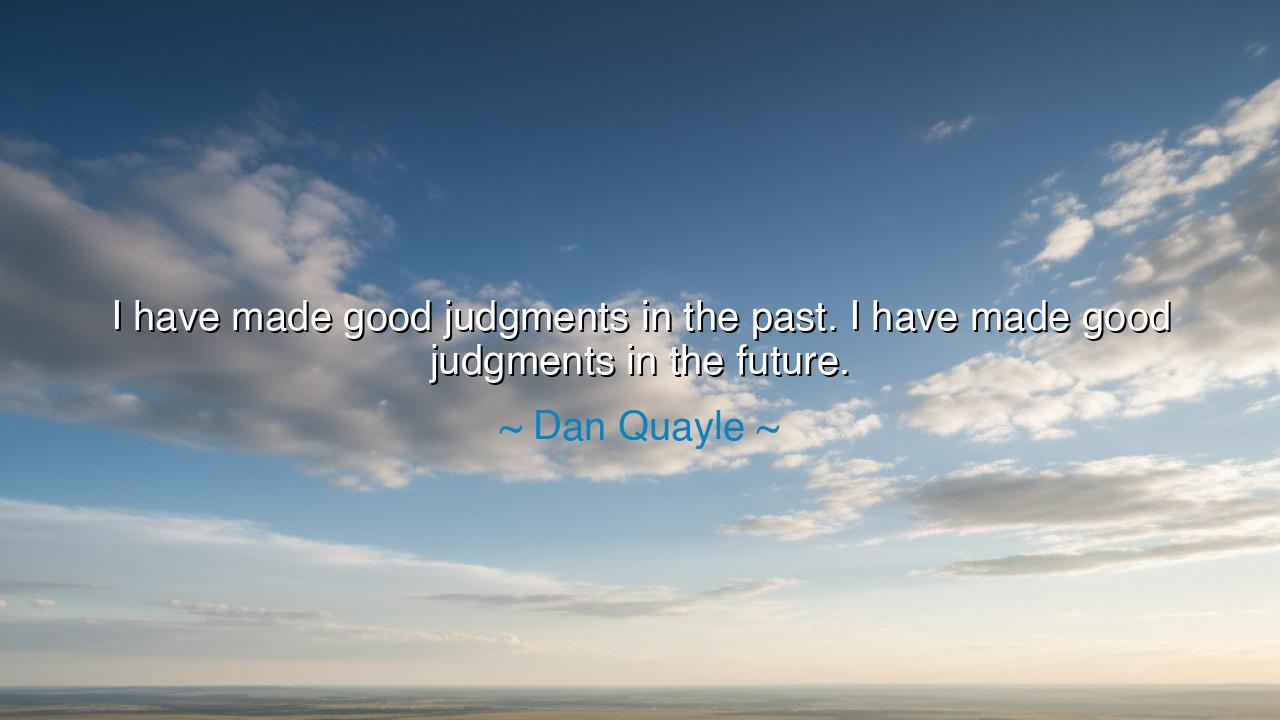
I have made good judgments in the past. I have made good






"I have made good judgments in the past. I have made good judgments in the future." These words, spoken by Dan Quayle, stand as a peculiar but profound reflection on the nature of judgment and decision-making. At first glance, they may seem to echo the certainty of someone who believes their decisions are always wise, regardless of time. But if we peel back the layers, these words reveal something deeper: a reflection on the nature of confidence, the illusion of foresight, and the human need to find affirmation in the choices we make, both in the past and in the future. What Quayle’s statement calls into question is the notion of certainty in judgment—a certainty that, like all human attributes, is often flawed by emotion, bias, and the unpredictable nature of life itself.
In the ancient world, wisdom and judgment were revered as the highest of virtues. The Greeks, particularly Socrates, Plato, and Aristotle, sought to define and explore what it meant to make good judgments. For Socrates, true wisdom was rooted not in certainty, but in acknowledging one’s ignorance. “I know that I know nothing” was his famous claim. What he meant was that wisdom begins with the humility to admit that one’s judgments are always provisional, always subject to change with new knowledge and experience. In this sense, judgment is an evolving process, not a static declaration. Quayle’s claim, then, is a reflection of a more optimistic or perhaps idealized perspective on human decision-making, in which one’s judgments are unshakable and infallible, despite the inherent limitations of human understanding.
Aristotle, too, examined the notion of good judgment, or what he called phronesis—practical wisdom. For him, judgment was not simply about knowing what is right, but understanding when and how to apply it in real-life situations. A good judgment requires both knowledge and experience. However, Aristotle also cautioned that judgment is often clouded by personal biases, emotions, and external pressures. The wisdom of the ancients reminds us that judgment is a practice that must be constantly refined, and even the most experienced thinkers are not immune to error. In this sense, Quayle’s declaration of perfect judgment in the past and future contrasts with the ancient view that all judgments—no matter how wise—are always subject to human fallibility.
Consider the example of Julius Caesar, whose decisions during his rise to power were often celebrated as brilliant and decisive. However, his decision to cross the Rubicon, which was considered a good judgment at the time, ultimately led to civil war and his eventual assassination. Caesar's judgment was made with certainty, yet history showed that even the most powerful and confident leaders could make errors with profound consequences. In this way, Caesar’s example serves as a reminder that while one may believe their judgment to be sound, history itself is often the final arbiter of its true worth.
The lesson from Quayle’s quote, when seen through this lens, is one of reflection and humility. To make good judgments is to balance confidence with self-awareness, understanding that while our decisions may appear sound in the moment, they are always subject to change with new perspectives and experiences. Confidence in one’s past judgments is valuable, but it must be tempered by the understanding that what is true today may not be true tomorrow. Judgment, at its best, is an evolving process that requires continual learning and growth.
In our own lives, we must strive to cultivate wisdom, understanding that good judgment is not a fixed trait, but something we must actively develop over time. Reflect on past decisions, not with the certainty that they were flawless, but with the awareness that they were made with the best information available at the time. Likewise, when looking to the future, we should make decisions with confidence but not blind certainty. We must allow room for the unknown, for uncertainty, and for learning as we move forward. Like the great thinkers and leaders before us, our judgments should be grounded in humility, and our confidence should come not from the belief that we are always right, but from the trust that we are willing to learn from our mistakes and to grow through experience.
Ultimately, Dan Quayle’s words are a reminder that judgment is a process, not an outcome. To make good judgments, we must be open to change, self-reflection, and the idea that we can always improve. Let us walk forward, making decisions with purpose and humility, always seeking to learn from both the triumphs and failures of our past, knowing that each choice is but another step in the ongoing journey of self-improvement and wisdom.






AAdministratorAdministrator
Welcome, honored guests. Please leave a comment, we will respond soon